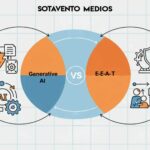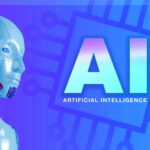In the fast-paced world of B2B revenue operations, efficiency is key to gaining a competitive edge. The traditional linear sales funnel, which relies on human-led discovery and manual qualification, is quickly becoming outdated. The driving force behind this shift is the rise of autonomous AI agents, specialized bots created not only to automate tasks but also to handle complex, multi-step processes with real-time adaptation and minimal human input.
This goes beyond just smart marketing automation; it marks a major shift toward Agentic Marketing. For technical SEO specialists, CMOs, and B2B operators in 2025, it is essential to understand how these agents are reshaping the lead generation funnel. This understanding is critical for a scalable growth strategy.
Rewiring the Top of Funnel (TOFU): Prospecting and Hyper-Automation
The early stages of B2B lead generation have often been the most labor-intensive. They depend on Sales Development Representatives (SDRs) for research, list building, and standard cold outreach. Autonomous AI agents are cutting down this workload by taking on up to 80% of routine SDR tasks, significantly lowering the Cost Per Lead (CPL) and boosting accuracy.
Automated Prospecting and Data Enrichment
AI agents are excellent at gathering and analyzing large amounts of data, including CRM history, firmographics, technographics, and real-time news. They build and enrich Ideal Customer Profiles (ICPs) with unmatched accuracy.
- Predictive Segmentation: Agents spot patterns among high-value clients to automatically segment new leads based on hundreds of shared traits. They can predict the likelihood of conversion even before any human interaction occurs.
- Real-Time Intent Signals: Autonomous agents constantly track digital activities, such as competitor website changes, hiring trends, and social media sentiment. This allows them to identify high-intent prospects who are actively searching for solutions. This shifts B2B marketing from reactive list-building to proactive, context-aware targeting.
Hyper-Personalization at Infinite Scale
Traditional personalization has often been limited to addressing someone by their first name. AI agents utilize Generative AI to provide genuine, deep personalization at scale across various channels, including email, chat, SMS, and voice.
Technical Insight: The agent gathers and connects a prospect’s unique context, such as industry challenges, recent company news, and website engagement, to craft a message that feels personal and relevant. This capability allows for the tailoring of thousands of simultaneous outreach sequences. It shortens the initial engagement phase and increases conversion rates by customizing content based on firmographics and buyer signals.
Transforming the Mid-Funnel: Qualification and Velocity
The middle of the funnel, which involves lead nurturing and qualification, is where B2B sales cycles often slow down, but AI agents inject vital speed and consistency here. They ensure that every high-fit lead receives immediate, relevant engagement.
Intelligent Lead Qualification (MQL to SQL)
Autonomous bots serve as 24/7 virtual assistants, instantly engaging website visitors and inbound leads. This immediate response greatly reduces the risk of lead decay and improves initial engagement rates.
- Conversational Qualification: AI-powered chatbots and voice agents conduct intelligent, two-way conversations, asking targeted qualifying questions, such as budget, timeline, and specific needs, based on preset criteria. This allows human sales reps to engage only with genuinely interested and well-vetted Sales Qualified Leads (SQLs).
- Meeting Scheduling Automation: One major point of friction—calendar back-and-forth—is eliminated. The agent integrates smoothly with company calendars, suggesting available times, booking meetings, and sending reminders. This results in noticeably lower meeting no-show rates.
Real-Time Funnel Optimization
The agent’s ability to learn continuously creates a self-healing funnel. Unlike static marketing automation, agents use real-time data to spot bottlenecks and adjust campaign parameters automatically.
- Dynamic Content Delivery: An AI agent can monitor a prospect’s interaction with a whitepaper and quickly follow up with a personalized case study relevant to their specific industry or company size, constantly optimizing the nurture path for the best chance of conversion.
- Predictive Lead Scoring: AI algorithms evaluate historical success data and engagement patterns to continually update lead scores in real-time. This dynamic prioritization ensures human sales efforts focus on the accounts most likely to close.
The Technical Imperative: Optimizing for AI Agents
For technical SEO and marketing managers, the rise of autonomous agents requires a crucial strategic change: we must now optimize for both human buyers and machine buyers (AI agents). The new B2B content approach must be API-friendly and machine-readable.
Schema Markup and Structured Content
The focus of technical SEO needs to shift to making sure AI agents can fully and accurately process your value proposition without human help. This can be done through strong implementation of structured data.
- Robot-Readable Content: Implement thorough schema markup, such as FAQPage, Product, and Solution on the back-end. This is vital for appearing in generative AI-assisted searches and ensuring machine understanding.
- Knowledge Graph Alignment: Optimize content to fit into knowledge graphs, allowing AI agents to quickly extract and confirm core descriptors and benefit statements. This technical clarity is crucial for B2B brands hoping to be recognized as trusted data sources by AI-powered search overviews.
Data Integration and Trust
The power of AI agents depends directly on the quality and accessibility of your first-party data. Seamless integration across your CRM, CMS, and analytics platforms is essential.
- Data Accuracy: An AI agent that automates outreach using outdated CRM data is a liability. Marketers must focus on data governance and employ AI agents to automate CRM updates, ensuring data accuracy and consistency. This builds the trust needed for agent autonomy.
- Agent Oversight and Ethics: Although agents handle large volumes, human strategists remain in control. Clear rules, human oversight checkpoints, and internal quality assurance processes are essential to avoid penalties from “over-optimization” or unintentionally robotic customer experiences.
From Funnel Management to Revenue Orchestration
The autonomous AI agent is not a substitute for B2B marketing and sales professionals. Instead, it serves as a powerful force multiplier. It automates the repetitive tasks, allowing humans to focus on judgment, strategic planning, creative problem-solving, and securing high-value deals.
Forward-thinking B2B organizations must stop treating their lead generation process as a simple linear funnel and start viewing it as an integrated revenue operations loop managed by intelligent agents. Failing to adopt this agentic marketing approach means losing speed, accuracy, and efficiency to competitors who are already leveraging this new virtual workforce. The competitive environment of 2025 requires you to move from managing a manual process to orchestrating an autonomous one.










